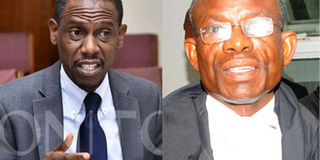Prime
AG Kiryowa, lawyers differ on executive order legality

Photo combo: Attorney General Kiryowa Kiwanuka and lawyer Peter Walubiri
What you need to know:
- Article 99(1) vests “the executive authority of Uganda” in the President but obliges the incumbent to exercise the authority in “accordance with provisions of the Constitution and the laws of Uganda”.
- Mr Museveni noted that he issued the orders in accordance with Article 99 (2) of the Constitution of Uganda, which vests executive authority in the President
Attorney General Kiryowa Kiwanuka, the principal legal advisor to government, and other legal brains yesterday read from different scripts over the legality of a raft of must-implement directives contained in an Executive Order that President Museveni issued.
In the Executive Order dated May 19, but released by State House only yesterday, the President banned charcoal business in northern and northeastern Uganda, stopped Balaalo pastoralists from settling with their animals in northern Uganda and put a full stop to entry into Uganda by armed Turkana.
He also ordered for a restructuring of manpower deployment in police to mass up personnel in sub-counties.
Mr Museveni noted that he issued the orders in accordance with Article 99 (2) of the Constitution of Uganda, which vests executive authority in the President
A section lawyers, however, described the Executive Orders as “unconstitutional, null and void”, prompting AG Kiryowa to ask them to question their interpretation.
“He (President Museveni) has issued an Executive Order and told us to go and implement it in accordance with the law; so, where is the illegality?” Mr Kiwanuka asked.
An Executive Order, which is different from administrative notices and directives, is a formally written, numbered proclamation that upon gazettement necessitates government-wide implementation in furtherance of an- existing law, but recourse for approval from the Legislature.
Constitutional lawyers, among them Mr Peter Walubiri, said the President in citing Article 99 of the Constitution as a basis for issuing the Executive Orders had “hoodwinked” Ugandans.
The United States, he opined, is the only country that has in place provisions through the Congress authorising a sitting President to issue Executive Orders for implementation by federal agencies.
“The President (Museveni) thinks this is a monarchy where he will just wake up and issue orders and they work. No. The Executive Order should be backed by other provisions in the Constitution [to stem abuse],” said Mr Walubiri.
Article 99(1) vests “the executive authority of Uganda” in the President but obliges the incumbent to exercise the authority in “accordance with provisions of the Constitution and the laws of Uganda”.
Other lawyers argued that Mr Museveni either misunderstood or chose to misuse this article.
Mr Isaac Ssemakadde, a lawyer and rights advocate, said Parliament has made no law as required by Article 79 (1) of the Constitution to empower the President to issue Executive Orders.
Article 72 (2) provides that “except as provided in this Constitution, no person or body other than Parliament shall have power to make provisions having the force of law in Uganda except under authority conferred by an Act of Parliament”.
According to Mr Ssemakadde, the issuance of the Executive Order proved an overreach by Mr Museveni as head of state and government, presenting the risk of abuse of the law.
“Article (99 of the Constitution) he is quoting will never stand alone unless it is backed by other provisions. What we are seeing now is the President trying to enforce his opinion as law,” he argued.
In an interview last night, senior presidential advisor on political affairs Moses Byaruhanga said the President’s proclamations were legal because the Attorney General, as chief legal advisor, had tendered a written opinion clearing him to issue Executive Orders.
Mr Ssemakadde, however, urged the President not to hijack Parliament’s law-making role.
Another lawyer named Abdallah Kiwanuka said the Executive Orders are “illegal” because they are not backed by a specific law and their issuance reflect, according to him, the President’s continued illegal actions, including creating agencies to do government work without the legal backing.
In a rejoinder, Attorney General Kiryowa said the Executive Orders, as issued by the President, are “legal and in conformity with the law”.
“How can it (Executive Order) be illegal? How can you say the Balaalo (pastoralists) have a right to move their cattle anywhere [in Uganda]? It cannot be, because there are people with land there. The Executive Order was issued to the (political) executives to ensure it (nomadism) does not happen; so, there is nothing unconstitutional about it,” he argued.
The AttorneyGeneral added: “If he (Museveni) issued an Executive Order saying ‘there will be no more people meeting to discuss anything in the country’, then you can say that order is contrary to the law … They (lawyers) need to go and see which article of the Constitution they have meant.”




